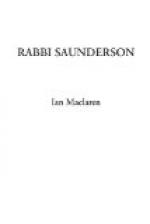The Rabbi cast an imploring glance, but Carmichael had still no understanding.
“But if one Presbyter should teach heresy to his flock in the hearing of another . . . even though it break the other’s heart, is not the path of duty fenced up on either side, verily a straight, narrow way, and hard for the feet to tread?”
“You have spoken to me, Rabbi, and . . . cleared yourself”—Carmichael was still somewhat sore—“and I’ll promise not to offend you again in an action sermon.”
“Albeit you intend it not so, yet are you making it harder for me to speak. . . . See you not . . . that I . . . that necessity is laid on me to declare this matter to my brother Presbyters in court assembled . . . but not in hearing of the people?” Then there was a stillness in the room, and the Rabbi, although he had closed his eyes, was conscious of the amazement on the young man’s face.
“Do you mean to say,” speaking very slowly, as one taken utterly aback, “that our Rabbi would come to my . . . to the Sacrament and hear me preach, and . . . report me for heresy to the Presbytery? Rabbi, I know we don’t agree about some things, and perhaps I was a little . . . annoyed a few minutes ago because you . . . know far more than I do, but that is nothing. For you to prosecute one of your boys and be the witness yourself. . . . Rabbi, you can’t mean it . . . say it’s a mistake.”
The old man only gave a deep sigh.
“If it were Dowbiggin or . . . any man except you, I wouldn’t care one straw, rather enjoy the debate, but you whom we have loved and looked up to and boasted about, why, it’s like . . . a father turning against his sons.”
The Rabbi made no sign.
“You live too much alone, Rabbi,” and Carmichael began again as the sense of the tragedy grew on him, “and nurse your conscience till it gets over tender; no other man would dream of . . . prosecuting a . . . fellow-minister in such circumstances. You have spoken to me like a father, surely that is enough”; and in his honest heat the young fellow knelt down by the Rabbi’s chair and took his hand.
[Illustration: “You have spoken to me like A father: Surely that is enough.”]
A tear rolled down the Rabbi’s cheek, and he looked fondly at the lad.
“Your words pierce me as sharp swords, John; spare me, for I can do none otherwise; all night I wrestled for release, but in vain.”
Carmichael had a sudden revulsion of feeling, such as befalls emotional and ill-disciplined natures when they are disappointed and mortified.
“Very good, Doctor Saunderson”—Carmichael rose awkwardly and stood on the hearthrug again, an elbow on the mantelpiece—“you must do as you please and as you think right. I am sorry that I . . . pressed you so far, but it was on grounds of our . . . friendship.
“Perhaps you will tell me as soon as you can what you propose to do, and when you will bring . . . this matter before the Presbytery. My sermon was fully written and . . . is at your disposal.”




